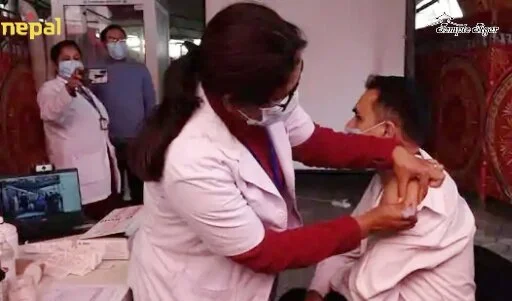COVID Vaccination officially started and Tourism in Nepal
Amidst mixed reactions from the citizens, the Nepal government rolled out its Covid-19 vaccination drive on Wednesday, a little over a year after the country confirmed its first coronavirus case on January 24, 2020. The virus so far has infected 270,854 people and as many as 2,027 have died of the complications resulting from the infection. The vaccination as a first priority will be given to frontline workers such as health workers, supporting staff, sanitation workers, female community health volunteers, security personnel, and people taking refuge in old age homes and then to all other citizens by age.
The vaccination program was launched after India supplied one million doses of Covid-19 vaccine, developed by the University of Oxford and pharmaceutical giant AstraZeneca and locally manufactured by the Serum Institute of India named Covishield. The Covidshield vaccine needs to be stored in temperatures between 2 to 8 degrees Celsius which can be stored in our existing storage facility for the vaccine to maintain its cold chain.
In a bid to expedite the first phase drive of Covid-19 vaccination, the Ministry of Health and Population are working to expand the ongoing immunization drive to be carried out from primary health centers. Earlier, the ministry had decided to launch the immunization programs from district hospitals only. The ministry aims to vaccinate 430,000 people in the first phase accomplishing the drive within 10 days aiming to complete the ongoing drive by February 5 2021. In the last four days (until Saturday), only 79,716 people received the jabs, according to the data provided by the Health Ministry, including 14,894 frontline workers on Saturday.
Over 21 million Nepalese (72 percent of the population) need to be vaccinated against Covid-19 as the vaccine produced has not been tested on children up to 14 years of age. Nepal is also considering to purchase additional vaccine as the current Covishield can be administered only to those aged 18 and above. The next shipment of 4 million Covisheild will be arriving very soon initiating the second phase of immunization.
A day after the vaccination program, the government has also decided to re-open 16 border points with India and China, allowing citizens of the respective countries to travel to Nepal. Initially, the government re-opened 14 border crossings only. The re-opening of the land points will surely facilitate Indian tourist movement into Nepal, especially during the upcoming Maha Shivaratri festival on March 11 when thousands of Indian pilgrims visit the Pashupatinath temple in Kathmandu.
On a positive note, the government is considering to allow unrestricted entry to Nepal for tourists who have vaccinated against the COVID in a bid to boost the morale of the moribund tourism industry ahead of the upcoming spring season. With the new rules in place, there will be no quarantine and coronavirus insurance requirements while, all visitors will need to provide a proof of having had the shot only. Nepal will not be the only one doing so as many countries have already started issuing a vaccine certificate or vaccine passport to international travelers. The government will also be reinstating the on-arrival visa soon for the visitors with the proof of vaccination, as at the moment the on-arrival visa is granted to officials of diplomatic missions and non-resident Nepalese only.
In summary, the vaccination and the nature of the vaccine has shown mixed reactions from the citizens. Nevertheless, entrepreneurs of the tourism industry are very hopeful for a positive outcome which is a sigh of relief. The government is also enthusiastically moving forward to create an environment to woo international travelers to Nepal. We sincerely hope that this will work out for the tourism industry to gain some momentum in the near future.

